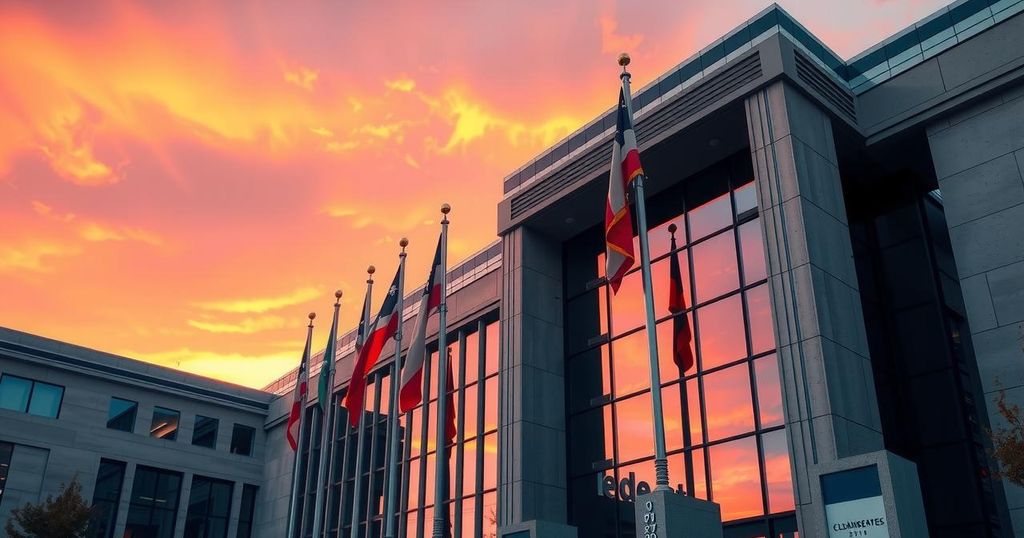South Africa Enters Diplomatic Crisis Following Ambassador’s Expulsion
South Africa is facing a diplomatic crisis following the expulsion of its ambassador to the U.S., Ibrahim Rasool. The incident, triggered by U.S. Secretary of State Marco Rubio’s declaration of Rasool as ‘persona non grata,’ reflects deeper policy disagreements between the ANC and the U.S. This diplomatic strife could threaten South Africa’s international standing and economic interests, particularly regarding trade. The ANC must now navigate the complexities of its foreign policy and reassess its strategies in response to this crisis.
South Africa is currently embroiled in a significant diplomatic crisis following the expulsion of its ambassador to the United States, Ibrahim Rasool. This issue intensified after U.S. Secretary of State Marco Rubio labelled Rasool as “persona non grata,” which many perceive as detrimental to the already fragile bilateral relations. This incident raises questions about South Africa’s foreign policy and its broader implications for the nation’s international standing and political landscape.
The diplomatic turmoil stems from significant policy disagreements between the African National Congress (ANC) and the U.S. government. Analysts contend that the removal of Rasool highlights the ANC’s mismanagement of foreign relations. Kylie Krill, CEO of AfriForum, has voiced concerns, cautioning that such diplomatic missteps jeopardize South Africa’s interactions and influence in global politics.
Rubio’s statement not only reflects Rasool’s behavior but also critiques the ANC’s inability to effectively address pressing foreign policy issues. Rubio described the ambassador’s remarks as incendiary, advocating for a representative capable of fostering productive dialogue. Tammy Bruce, the State Department spokesperson, noted, “We expect a level of respect, especially if it is in a position built for facilitating international relations,” following Rasool’s criticisms of former President Trump’s policies.
Tensions between South Africa and the U.S. have been exacerbated by accusations from Trump regarding the nation’s land reform policies targeting white farmers, with suggestions of expedited U.S. citizenship for those fleeing perceived injustices. Rasool’s participation in discussions critiquing these policies likely contributed to the fallout, as he warned against the resurgence of racial supremacy in U.S. politics, prompting the U.S. administration to distance itself from him.
Domestic reactions to the ambassador’s expulsion have been polarized, oscillating between outrage and acceptance. Commentators assert that the ANC’s diplomatic strategies are misaligned with national interests, emphasizing the necessity for a foreign policy realignment. Sandile Swana, a political analyst, remarked, “The expulsion underscores the need for a recalibrated foreign policy that genuinely represents South Africa’s unique position on the global stage.”
The economic ramifications of this diplomatic debacle are becoming increasingly apparent. The ANC’s history of resisting apartheid is at risk of being overshadowed by current controversies, potentially complicating trade negotiations under the African Growth and Opportunity Act (AGOA), through which South Africa exports approximately $3.6 billion to the U.S. Strained bilateral relations have prompted U.S. entities like Franklin Resources and JP Morgan Chase to divest from South African bonds, a shift impacting investor confidence significantly.
The Johannesburg Stock Exchange witnessed a substantial outflow of around 16.1 billion rand in March 2025, echoing trends seen during prior political uncertainties. Analysts suggest fears surrounding AGOA’s status due to the U.S. reassessment consequent to this diplomatic rift may provoke further capital flight.
In navigating this challenging scenario, ANC leader Nomvula Mokonyane has expressed commitment to fostering alliances with international partners, stating, “It is essential for South Africa to stand firm against any forms of control from outside forces.” While several critiques of the ANC’s foreign policy persist, the party defends its historical struggles against colonialism and racism as foundations for its current diplomatic stance.
As South Africa seeks to redefine its foreign policy following Rasool’s expulsion, the future of its relationship with the United States stands at a pivotal juncture. The ANC now faces the challenge of whether to embrace strategic realignment or to persist in confrontational tactics. What remains evident is the necessity for South Africa to strategically navigate its international relations during this critical time.
In conclusion, South Africa is experiencing a profound diplomatic crisis following the expulsion of Ambassador Ibrahim Rasool by the United States. This incident highlights the significant policy rifts between the ANC and the U.S. government, raising concerns about South Africa’s international relationships and political standing. The economic consequences of this diplomatic fallout further complicate matters, as the nation grapples with declining investor confidence and trade negotiations. As South Africa reassesses its foreign policy, the resolution of its relationship with the U.S. hangs precariously in the balance, necessitating strategic decisions from the ANC.
Original Source: evrimagaci.org




Post Comment